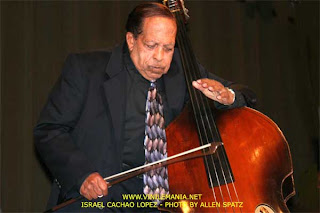
Another of the truly grat ones has left us:
Cuban bass player, mambo pioneer Cachao dies in Miami area
By ADRIAN SAINZ
Associated Press Writer
MIAMI - Cuban bassist and composer Israel "Cachao" Lopez, who is credited with pioneering the mambo style of music, died Saturday at age 89, a family spokesman said.
Known simply as Cachao, the Grammy-winning musician had fallen ill in the past week and died surrounded by family members at Coral Gables Hospital, spokesman Nelson Albareda said.
Cachao left communist Cuba and came to the United States in the early 1960s. He continued to perform into his late 80s, including a performance after the death of trombonist Generoso Jimenez in September 2007.
Cachao was born in Havana in 1918 to a family of musicians. A classically trained bassist, he began performing with the Havana symphony orchestra as a teenager, working under the baton of visiting guest conductors like Herbert von Karajan, Igor Stravinsky and Heitor Villa-Lobos during his nearly 30-year career with the symphony.
He also wrote hundreds of songs in Cuba for bands and orchestras, many based on the classic Cuban music style known as son.
He and his late brother, multi-instrumentalist Orestes Lopez, are known for the creation in the late 1930s of the mambo, which emerged from their improvisational work with the danzon, an elegant musical style that lends itself to slow dancing.
"The origins of `mambo' happened in 1937," Cachao said in a 2004 interview with The San Francisco Chronicle. "My brother and I were trying to add something new to our music and came up with a section that we called danzon mambo. It made an impact and stirred up people. At that time our music needed that type of enrichment."
The mambo was embraced early on and Cuban composers and jazz musicians have tweaked it over the years. It also influenced the development of salsa music.
In the 1950s, Cachao and his friends began popularizing the descarga ("discharge" in Spanish), a raucous jam session incorporating elements of jazz and Afro-Cuban musical approaches.
Cachao left Cuba in 1962, relocating first to Spain, and soon afterward came to New York where he was hired to perform at the Palladium nightclub with the leading Latin bands.
In the United States, he collaborated with such Latin music stars such as Tito Puente, Tito Rodrigues, Machito, Chico O'Farrill, Eddie Palmieri and Gloria Estefan.
He fell into obscurity during the 1980s after he moved to Miami, where he ended up playing in small clubs and weddings.
But his career enjoyed a revival in the 1990s with the help of Cuban-American actor Andy Garcia, who made a 1993 documentary about the bassist's career, "Cachao ... Como Su Ritmo No Hay Dos" (Like His Rhythm There Is No Other) and also produced several CDs, including the Grammy-winning album "Ahora Si!" in 2004.
In 2006, Cachao was saluted at two Jazz at Lincoln Center concerts with the Afro-Latin Jazz Orchestra paying tribute to the Latin bass tradition, and he led a mambo all-star band at a JVC Jazz Festival program at Carnegie Hall.
In a statement Saturday, Garcia credited Cachao with being a major influence in Cuban musical history and said his passing marked the end of an era.
"Cachao is our musical father. He is revered by all who have come in contact with him and his music," Garcia said. "Maestro ... you have been my teacher, and you took me in like a son. So I will continue to rejoice with your music and carry our traditions wherever I go, in your honor."
Cuban-born reed player and composer Paquito D'Rivera said Cachao made friends everywhere he went with his affable personality and good sense of humor. D'Rivera said he was working on a piece he had written for the multiple Grammy winner when he heard about the death.
"He was what a great musician should be. He represented what true versatility in music is all about," D'Rivera told The Associated Press in a telephone interview.

No comments:
Post a Comment